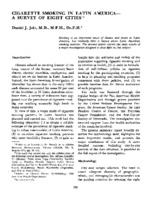Participación de la comunidad en la erradicación de la malaria
Date
s.d.1966
Author
Metadata
Show full item recordAbstract
Community participation in malaria eradication programs in the Americas has so far been satisfactory. With the help of health education the best results were obtained in intradomiciliary spraying with residual insecticides, and it can be said that now there are fewer than 5 percent refusals, and in radical treatment with primaquine, over 99 percent acceptance is usually obtained. The greatest difficulties in obtaining active community participation, especially in rural areas, were encountered with mass treatment with antimalaria drugs (primaquine-chloroquine) administered fortnightly house by house; these may be attributed mainly to the side effects produced by the association of drugs. If it is possible to obtain an association of drugs that does not produce side effects, especially in children and the aged, the communities will accept practically all these health measures. The contribution made by the communities to eradication campaigns is indicated by the fact that in Middle America alone there are more than 50,000 voluntary collaborators in charge of notification posts. Nevertheless, as eradication procedures advance and large areas enter the consolidation phase, the task of educating the community becomes more difficult, owing to the fact tha although malaria no longer exists there, blood smears still have to be taken for purpose of evaluation. Community interest and cooperation
Translated title
Community participation en malaria eradication
Subject
Collections
Related items
Showing items related by title, author, creator and subject.
-
Kujawa, Henrique; Pinto, Rodrigo Silveira; Leles, Fernando Antônio Gomes; Machado, Frederico Viana (2023)[RESUMO]. A presente revisão narrativa discute a relevância e os desafios da participação em saúde para o fortalecimento dos sistemas de atenção à saúde. Partindo de uma definição de participação em saúde como um processo ...
-
Joly, D. J (1975)During the period 1962-1964, diseases related to cigarette smoking were responsible for 20 per cent of all deaths in men between the ages of 35 and 64 in 10 large Latin American cities, and in the years that followed various ...
-
Valdez, Dianelba; Keys, Hunter; Ureña, Keyla; Cabral, Domingo; Camilo, Francisco; Ogando, Eulalia C.; Mercedes, Luz; Noland, Gregory S.; Blount, Stephen B.; Lavery, James V.; Desir, Luccene; Puello, Jose (2020)[ABSTRACT]. Community engagement is crucial for public health initiatives, yet it remains an under-studied process within national disease elimination programs. This report shares key lessons learned for community engagement ...




